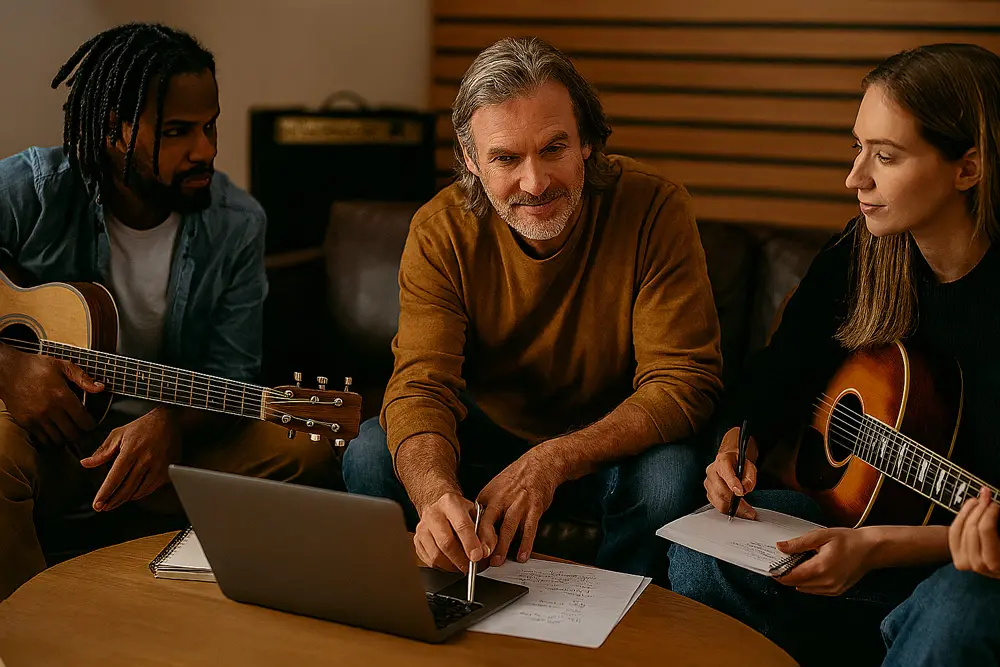Collaboration can be one of the most rewarding parts of songwriting. It brings fresh perspectives, new ideas, and creative chemistry to the table. But without clear agreements, even great collaborations can lead to confusion or conflict down the road.
by SongwriterDemoService Staff | October, 13, 2025.

Before you begin co-writing, ensure that you have the necessary documentation in place to protect your rights and maintain your relationships.
Even before you start documenting anything, you need to reach an understanding of how ownership will be managed. In other words, you need to lay out some ground rules. Here are some things to consider…
Every co-write should start with an honest conversation about who owns what. Song ownership doesn't have to be complicated, but it must be clear. Even among friends, misunderstandings can occur if percentages aren't discussed upfront.
The most common approach is for each writer to share credit equally. Country writers, particularly in Nashville, take this approach with the idea that every writer was present and collaborated from the start. One thought here is that, especially if the writers have publishing deals, each publishing company would have an equal share, thus, equal motivation to market the song to artists and producers.
Used when one writer contributes more heavily to lyrics, melody, or concept. Professional pop songwriters tend to take this approach. This would be especially true if one or two writers wrote the bulk of a song first, and another writer joined later and wrote a section, such as the bridge, or contributed some revisions to existing parts.
The key is to agree on the terms before recording or registering the song. That clarity protects everyone involved and prevents disputes later when royalties or opportunities arise
Once ownership is discussed, document it in writing. A Song Split Sheet records each co-writer's contribution and percentage of ownership, along with contact info and signatures. This simple form can save you from future legal or financial headaches.
↓📁📄 Download: Song Split Sheet (PDF 108k)
A simple agreement for co-writers to clearly define each person's contributions and ownership percentages for a song.
Along with your split sheet, maintain a Song Creation Proof Log for every song. It's a single-page record of when the song began, who contributed what, and how it evolved over time. This log serves as timestamped evidence of your authorship, in case any questions ever arise.
↓📁📄 Download: Song Creation Proof Log (PDF 47k)
A single-song record sheet for documenting dates, collaborators, contributions, and revisions to help establish authorship and protect your rights.
Once your song is finished, and before releasing or pitching it, register it with the Copyright Office. 🌐↗
Even if you already have your logs and split sheets, official registration gives you complete legal protection and the right to pursue damages if your work is infringed upon.
You can register individual songs or group multiple unpublished songs together as a collection to save money.
The best protection is mutual respect. Discuss expectations early, such as who will handle the demo, who will submit to publishers, and how costs will be shared. When everything is transparent, collaborators can focus on what matters most: writing great songs.
Co-writing should feel exciting, not stressful. By documenting ownership, maintaining accurate records, and registering your work, you ensure that your creativity is protected at every step.
🎵 When you're ready to bring your song to life, we'll help you record a professional demo that does it justice.
👉 Click to hear our samples, or scroll belowview our services and pricing, or contact us with any questions you may have. We're ready to help!
Ready to send your song? We'll guide you from rough idea to polished, pitch-ready demo.
Get StartedFind the type of demo that fits your song's needs, your recording budget, and your creative goals.
See ServicesCheck out our FAQ or drop us a message. We're here to help you every step of the way.
Visit FAQ